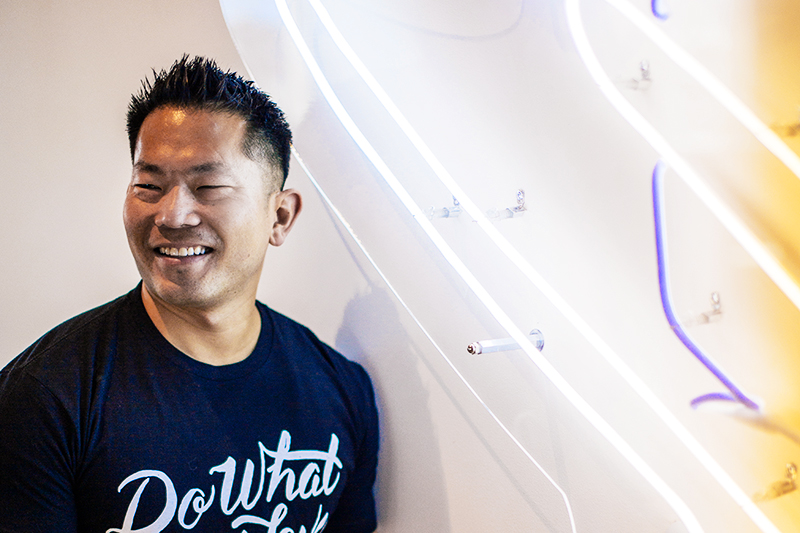Superpower on the Side features WeWork team members and how they spend their time when they’re not at work.
Johnny Ahn has been performing for as long as he remembers. It began at age six, when he created a dance routine to the song “Opportunities” by the Pet Shop Boys.
The next year, when he was seven, tragedy struck—he lost both of his parents in a car accident. It was a devastating loss, one that shaped him into the person he is today. “I think having lost my parents when I was young, I’ve always had a sense of wanting and seeking approval from people,” says Ahn, now 36 and a WeWork sales trainer in Salt Lake City. “And I think that’s what grew me into a performer.”
After his parents’ death, Ahn moved from Irvine, California, to Provo, Utah, to live with his sister, then a sophomore at Brigham Young University. It was there that he discovered a new way to earn recognition and praise: ballroom dancing.
“Utah is known for ballroom dancing,” explains Ahn. “BYU has a really strong program that then trickles down into the community and culture. So in junior high, you can either do ballroom dancing or P.E. And I thought, OK, let’s try this dance thing out. Then I found out I was pretty good at it.”
After discovering this new talent, Ahn jumped in with both feet. He joined the youth dance program at BYU, found a dance partner, and they started taking private lessons and traveling to competitions around Idaho and southern California. More often than not, they placed among the top finalists.

“I’m kind of competitive in nature, so once I started competing, I really got the bug for it,” says Ahn. “I think the fact that I was relatively good at it compared to my peers who were also in my class gave me a sense of approval, that I was ‘cool.’ And it drove me to keep competing because I was seeking more of that feeling of being looked up to.”
Although Ahn thrived on praise for his dancing, over time, he stopped finding fulfillment in it. “The more I competed, the more dance became about the competition and how well I could do,” he says. “My happiness seemed to hinge upon it as opposed to enjoying dance for the sake of dancing.” He shifted his focus to other activities as he moved toward college.
After graduating from BYU in 2006 with a degree in accounting, he accepted a position at a local firm. But a year and a half after graduating, he felt the pull to perform again. He quit his job to work at a local studio teaching singing and dance lessons. “In teaching dance, I always found satisfaction in helping out people who wanted to learn and being able to really fine-tune them and help them become better dancers,” says Ahn. “I just love to be able to get them on the right path.”
As he reimmersed himself in the dance world, Ahn started practicing breakdancing in addition to ballroom. In 2011, he decided to jump all the way back into his dance shoes, enrolling in the dance program at Utah Valley University, where he joined the school’s international touring ballroom dance team.
For the next two years, Ahn and his fellow dancers traveled around the world competing on the international stage. In 2012, when producers from Fox traveled to nearby Salt Lake to hold auditions for the ninth season of So You Think You Can Dance, Ahn decided to take his shot.
“It took a few tries, but I ended up getting 10 minutes of airtime,” says Ahn, who competed with his dance partner Whitney Hallam.
Though he was ultimately eliminated in the fourth round, he says going on the show was a good experience.

“I was kind of a goofball on the show,” says Ahn. “I ended up playing like I was this ladies’ man. It’s kind of hard for me to watch now, because it’s sort of silly and slapstick. But it was fun! It was a television show and I knew [the humor] would sell more, so I kind of just went with it.”
By 2014, he was ready to start yet another new chapter. Craving the stability of a 9-to-5 job, Ahn spent some time analyzing his skill set. He realized that he could combine what he loved about teaching (helping people improve their skills) with his history as a performer who thrived on engaging people around very specific content, and use that expertise to build a new career training professionals.
“I’ve talked to other people who have been trainers and educators in a workplace and they understand teaching is performing in a sense,” says Ahn. “It’s a little stage and the content is different; it’s more structured. But it’s that same thing of operating in front of a live audience, getting a live response. So I think part of the reason why I like training is for that aspect.”
After building up his résumé in sales training at a couple of other Utah-based companies, in January Ahn was hired at WeWork, where he focuses on enterprise technology. Though he spends a lot less of his free time dancing these days, he says he still feels fulfilled as a performer through his role at the company.
“I take the same approach when it comes to sales training here at WeWork [as when teaching dance],” says Ahn. “Wherever a person is coming from, I want to cut out the fat and distractions and get them on the right path of what they need to know.”







